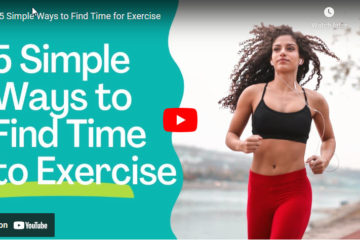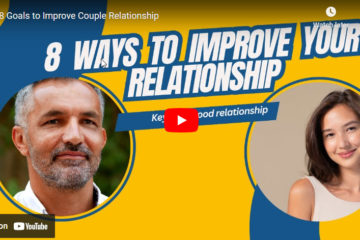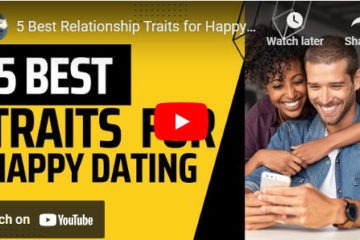#1 Be an Active Listener with your Partner
One of the keyways to build good relationships is to be an active listener. Everyone wants to be heard and show the other person that you hear and understand what they are saying. Body language is essential. Look at your partner’s eyes when they are communicating with you. Never look away when anyone is talking to you. That shows you don’t care about what is being said. Don’t interrupt your partner when they are talking but also, don’t allow them to continually talk without stopping. There will be times when you may need to break into the conversation, if your partner is the type that talks continually.

Repeat back the concept and ideas your partner is communicating to you. This gives the other person the nonverbal signal that you are listening and understand what is being said. Early in the relationship, active listening is fairly easy because you are so into the other person. However, as time moves on and you become more familiar, you need to be disciplined and intentional with active listening.
It’s easy to blow the other person off and not really listen to them, especially as you become more familiar with them. Stay disciplined with active listening with your partner and with your friends too.
#2 Establishing Early Expectation What You want out of Relationship
It’s important to establish early expectations in any relationship. If you are dating and expect your partner to be with you every day, then you need to communicate that. Some people are happy to be together on weekends or several days per week due to their work schedule and being together every day is not possible.
Many partners expect daily phone calls while others are happy talking a few times per week. As your relationship becomes more serious, discuss your desires, such as how many times per week you will be together, keeping in mind their schedule and restrictions. Eventually, if marriage is on your mind, that too should be discussed or at least mentioned as a possibility after a year of serious dating. Your partner deserves to know where you stand in terms of long-term relationship and if that relationship will eventually end in marriage. If one or neither person desires marriage, then that’s good too, as long as you both are on the same page.

You should also be on the same page with activities. It’s fun to do things with your partner early in the relationship but as the relationship matures, activities can become a problem. You may not enjoy the same activities as your partner, and you need to express that in a loving way and allow your partner to do the activities they enjoyed. Putting pressure on your partner to stop or eventually give up the activities they enjoy is a relationship killer. You need to discuss early in the relationship the important activities or constraints you are not willing to negotiate. If you overlook this important fact of establishing expectations early, you will endure much frustration because your relationship will look different for each partner and demands will be placed on you that you will later regret.
#3 Enjoy Doing Things Together
The beautiful thing about dating is doing things together with someone you really like. Find mutual things that you both enjoy doing together but beware about doing everything together. Early in a relationship it’s easy to do everything together. However, months later or maybe a year later, you will become aware that there are activities that your partner likes that you don’t care to do. If you don’t address early in the relationship what you enjoy doing together and what you prefer to do by yourself or with other friends, your partner will take that as a sign of rejection and needless conflict will arise. That’s why it’s important to establish early activities you enjoy together and activities that you prefer to do alone or with other friends. When those boundaries are established early in the relationship, you don’t have to disappoint your partner by suddenly springing on them that you prefer certain activities alone or with friends, and the conflict that comes with that discovery. If you are involved in certain activities that are sacred like hobbies or volunteer work that does not involve your partner, establish these boundaries early in the relationship to avoid disappointment and resentment later.
#4 Put Each Other First
The best way to build a loving relationship is to put the other person first. Knowing what is important to your partner is key to building a lasting and loving relationship. Listen to your partner issues and give those issues priority. Now here’s the trick ! This goes both ways ! Your partner should be doing the same for you too. If you address the concerns of your partner but they don’t address your concern or put you first too, resentment will eventually condemn the relationship to failure. So, as you put the other person first, make sure they also address your concerns and needs and ask your partner to reciprocate that love with you. If you don’t, the relationship will become lopsided with one partner doing everything and the other partner expecting you to fulfill all their needs without addressing your needs.

Address your concerns early when your relationship seems like you are doing all the work, and the partner is doing all the taking. This is a very sensitive issue, but it needs to be delicately discussed if you feel the relationship is going this way. The problem comes with infatuation with your partner where you will do anything for them early in the relationship. Then you wake up months or years later and realize that you have been used or taken for granted. So, deal with mutual give-and-take early in the relationship. Do not take advantage of your partner’s kindness. Let them know how much you enjoy what they do for you !
#5 Make Forgiveness a Priority in your Relationships
Every relationship will experience hurt. Be quick to forgive and move on. Do not hold grudges. Do not retaliate. If you do, you are sabotaging the relationship probably without awareness. Practice forgiveness because no relationship is perfect, and mistakes happen. Learning to forgive and move forward together is crucial for the growth and stability of the relationship. Holding onto grudges or dwelling on past mistakes can create resentment and damage the bond. Treat your partner like you would want to be treated and be quick to forgive petty arguments and missteps because they are sure to come. Sometimes in frequent waves.











